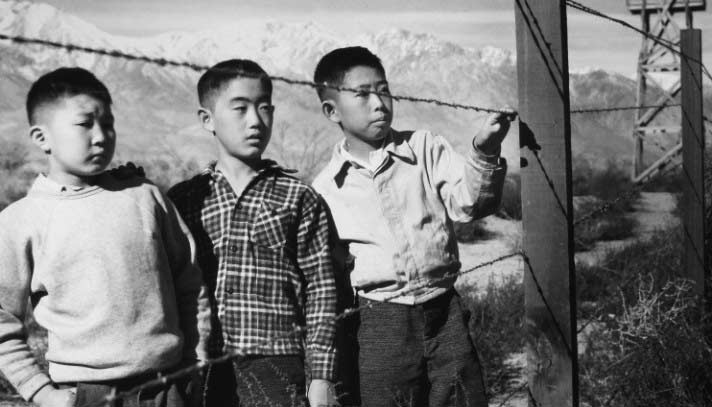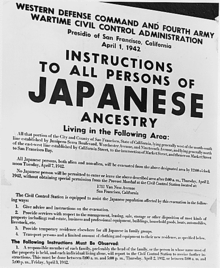
on December 7, 1941, Japanese forces, under the command of Vice-Admiral Nagumo, attacked by surprise and without declaration of war the American base at Pearl Harbor on the island of Oahu, Hawaii. The event, which marked the entry of the United States into the Second World War, was not without immediate immediate repercussions for "Japanese-American" residents.
Between December 7 and 11, the FBI arrested 1,370 of them. Soon the "camps" followed, called "resettlement." A euphemism for "concentration camps" in northern and eastern California (Arizona, Arkansas, Colorado, Idaho, Utah and Wyoming), in which most Americans Japanese ancestry; 120,313 will be "displaced": children, grandchildren and great-grandchildren of "yellow monkees". The camps functioned from March 1942 (opening of the Manzanar camp, which included up to 10,046 internees) to March 1946 (when Tule Lake camp was closed and up to 18,789 interned). As early as June 1942, nearly 100,000 Japanese-Americans had been "evacuated", and 120,313 were evacuated. There were attempts to escape; many victims due to lack of care. The camps were located in hostile areas, battered by arid winds, with very large temperature gaps.

Julie Otsuka, in a novel with a certain refinement, unforgiving in its end, with a biting irony, endeavors to nourish, through fiction, a reality all the more "approached" that it was that of his ancestors. A family which, like the novel, experienced curfews, the prohibition of traveling within a radius of more than 5 miles around its home, the blocking of bank accounts, evacuation, appearing before the "Loyalty Assessment Board of the Control Commission of Nationals of an Enemy Country", "assembly centers", dispersal in different camps (husband separated from wife, father of children), the number pinned on the collar, the barracks covered with tarred paper, the correspondence submitted to the censor's tools, the dust that infiltrates "into your dreams", the dismal condition of a detention that ran on a little more than three years. The 25 dollars paid in cash, at the time of exit. "The same amount as that allocated to criminals" upon their release.
A confused reintegration. Why, overnight, had they faced a situation of forced suspicion, isolation and confinement? Because they had "the face of the enemy", and it never does good to be so "stared" in times of war. (The bombing of Pearl Harbor had heightened fears of an invasion of the West Coast by means of a combined attack "from inside and outside." He had "naturally" exasperated an "anti- yellow ".) What was true in 1942, in the United States of America, was also true elsewhere. And much worse. No "Japanese-American" was convinced during this crucial period of intelligence with the (Japanese) enemy. Others were committed. Point them. As a result of the capitulation, Japan was present on September 27, 1945, at the "rising" of a man, at the "sunset" of a god.
by Bruno Rochette
Following upvoted and resteemed
Downvoting a post can decrease pending rewards and make it less visible. Common reasons:
Submit
nice
good writing
Downvoting a post can decrease pending rewards and make it less visible. Common reasons:
Submit